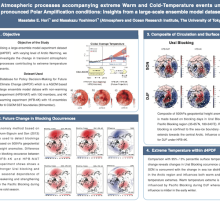Atmospheric Processes Accompanying Extreme Warm and Cold-Temperature Events Under Pronounced Polar Amplification Conditions: Insights from a Large-Scale Ensemble Model Dataset
Masatake
Hori
Atmosphere and Ocean Research Institute, The University of Tokyo
Poster
The frequency of extreme high and low-temperature events in the Arctic is known to undergo significant changes in response to the decline in sea-ice concentration due to global warming. Previous research has indicated that low-temperature events become less severe, while extreme high-temperature events become more frequent, especially in Eurasian coastal regions where sea-ice reduction is pronounced in future projection experiments. In this study, we utilize results from a large-scale multi-ensemble model dataset (d4PDF) to report on how the change in extreme events can be attributed to transient atmospheric variability, including changes in the frequency of blocking phenomena under various conditions, including non-warming and historical experiments, as well as 2K and 4K global warming conditions.

hori-masatake-polar-poster.pdf
(4.92 MB)
